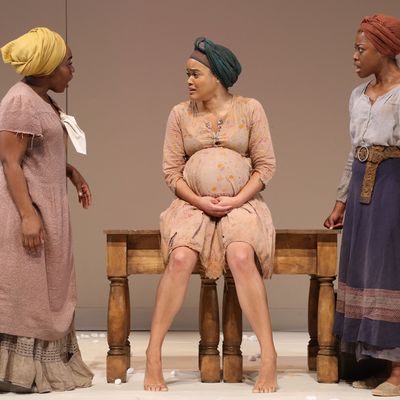
There are few plays I disliked last year as much as Branden Jacobs-Jenkins’s Appropriate, the story of a nasty white Arkansas family discovering in the ancestral plantation a collection of lynching memorabilia. I found it to be melodramatic and sloppy, hysterical without being funny. Now, though, in light of Jacobs-Jenkins’s An Octoroon — a Soho Rep production that opened recently at the Theater for a New Audience’s Polonsky Shakespeare Center — I might have to revisit, and upgrade, that opinion. Not just because An Octoroon is so good, but also because its excellences are often hard to distinguish from what I took to be the earlier play’s failings. This one’s hysterical and funny, and so smart it forces you to question the theatrical implications of both terms.
If An Octoroon’s hysteria is more enjoyable than that of Appropriate, partly that’s the result of its elaborate formal conceit. A character identified as Jacobs-Jenkins himself, and dressed only in underwear, explains in a prologue called “The Art of Dramatic Composition” that An Octoroon was written at the suggestion of his therapist as a way of battling mild depression by reconnecting with work that once gave him pleasure. Whether or not that’s true, the work specifically reconnected to is an authentic melodrama: Dion Boucicault’s 1859 The Octoroon, one of its century’s most popular works but almost completely erased from the culture since then. Among many other things, then, An Octoroon is an opportunity to experience The Octoroon, even if it takes some 15 funny-sour minutes of metatheatrical throat-clearing, in which the Jacobs-Jenkins character applies whiteface for the role of the dashing plantation heir George, while a character representing Boucicault (who was also an actor) applies redface for the role of a drunken Indian, to get to the play proper.
Or not quite proper. Yes, George falls tragically in love with his late uncle’s illegitimate octoroon daughter, Zoe, and, yes, his Louisiana plantation, Terrebonne, is threatened with foreclosure, just as Boucicault wrote it. But while retaining the basic plot and perhaps a third of the dialogue, An Octoroon radically shifts the emphasis of the play-within-the-play, and ironizes it, in two ways. One is by the recoloration of the cast; when a black actor plays a black playwright playing a white (or actually sort of ecru) slave owner, lines like “How I enjoy the folksy ways of the niggers down here” come off differently. The other shift involves the slaves themselves. In the Boucicault they are either stock characters (the obsequious Uncle Tom, the half-wit “picayune”) or, worse, completely uncharacterized and interchangeable. Jacobs-Jenkins not only gives much fuller lives and stage time to the three slave women Boucicault called Minnie, Dido, and Grace, but also gives them the incongruous patois and expectations of empowered post-Oprah sistas. “You can’t be bringing your work home with you,” Minnie tells Dido, who is angry about being called “Mammy” by Zoe even though they are basically the same age. “I know we slaves and evurthang, but you are not your job.”
This is hilarious, though at some point, possibly around the time Grace complains that Minnie is too “ghetto,” you begin to wonder why. Is laughing at the clichés of contemporary urban blackness, albeit as offered by a black playwright, any different from laughing at the clichés of antebellum rural blackness, as offered by a white one? The latter we call minstrelsy, and rightly abjure. But Jacobs-Jenkins keeps aiming you right into that confusion, having located in political incorrectness a way to remodel and reenergize the old genre. Melodrama was built on the theatrics of sensation, in which the audience’s resistance to what were already tired stories would be overwhelmed by a flooding of the senses. Music, violence, spectacle were all on the menu, and though An Octoroon faithfully incorporates these — Lester St. Louis provides a lovely cello accompaniment to the action — it does so with an asterisk because their realistic representation would be prohibitively expensive and at any rate unconvincing. Take the spectacle, for instance: Boucicault prescribed the burning and explosion of a boat overloaded with cotton as the climax of the action. Here that bit of stagecraft is rethought and split in two. One part is a delightful coup de théâtre by the director Sarah Benson (working with the scenic designer Mimi Lien) that metaphorizes the effect of the explosion through sight, sound, touch, and even smell. The other is a purely visual shocker I can’t give away. Let’s just say that Jacobs-Jenkins picks up in An Octoroon where Appropriate left off.
I wonder if he went too far — and I wonder if he meant us to wonder. Doubt is, after all, the method of the whole play, which repeatedly pulls the rug out from under itself, tempting you with enjoyment and then calling you to account for having enjoyed. In fact, if I were looking to quibble, I would say that Jacobs-Jenkins miscalculates, or perhaps just doesn’t care enough about, the audience’s tolerance for provocation, however funny; in a stew that will accept almost any ingredient, eventually some begin to seem extraneous. What is the point, for instance, of one character’s self-administered wedgie? Or of the adorable Br’er Rabbit (played by Jacobs-Jenkins himself) wandering silently through some of the action? There are hints and cross-references, allusions to African folk tales and the author’s earlier plays, but please, this isn’t Ulysses.
End of quibble. The play is a feast, overcatered but unlikely to be forgotten, and Benson’s staging is superb. Austin Smith, as both the Jacobs-Jenkins figure and George (and also George’s nemesis, M’Closky), makes a notable professional New York stage debut; the rest of the young cast, especially Mary Wiseman as the dim belle Dora, squeeze more out of the clichés of melodrama than it seems possible Boucicault put there. Like Jacobs-Jenkins, they have their stereotypes and eat them too.
An Octoroon is at the Polonsky Shakespeare Center through March 29.




